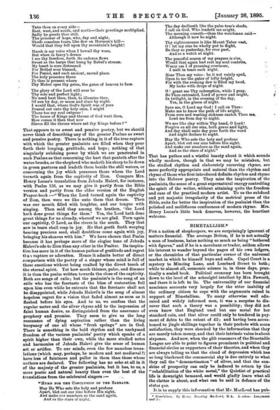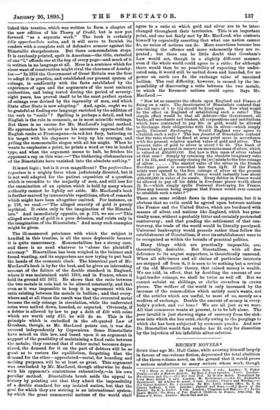BIMET.ALLISM.*
FOR a nation of shopkeepers, we are surprisingly ignorant of matters financial. The average Briton, if he is not actually a man of business, hates nothing so much as being "bothered with figures," and if he is a merchant or trader, seldom allows his interest to wander beyond the pages of his own ledgers, or the chronicles of that particular corner of the universal market in which he himself buys and sells. Capel Court is a mystery to Mincing Lane, and Lombard Street to both ; while to almost all, economic science is, in these days, prac- tically a sealed book. Political economy has been brought down to the level of the schoolgirl intellect by Mrs. Fawcett, and there it is left to lie. The universality of our financial nescience accounts very largely for the utter inability of the ordinary citizen to cope with the arguments raised in support of Bimetallism. To many otherwise well edu- cated and widely informed men, it was a surprise to dis- cover that such a theory was a possibility; they did not even know that England used but one metal for her standard coin, and that silver could only be tendered in pay- ment of debts to the extent of £2 ; and having been accus- tomed to jingle shillings together in their pockets with some satisfaction, they were shocked by the information that they are merely token-money, and that their intrinsic value is about sixpence. And now, when the glib reasoners of the Bimetallic League are able to point to figures prominent in political and financial circles as supporters of their theories, and when they are always telling us that the cloud of depression which has so long blackened the commercial sky is due entirely to what they call the " demonetisation " of silver, and that the sun- shine of prosperity can only be induced to return by the "rehabilitation of the white metal," the Quietist of practical life is downright bemazed, and would gladly learn what all the clatter is about, and what can be said in defence of the atat us quo.
It is to supply this information that Mr. MacLeod has pub- • Bfm•n'isn. By Ht,ari Dawning Ma.,L;v1, M.A. L •ndoa: Longman and U.,. fished this treatise, which was written to form a chapter of the new edition of his Theory of Credit, but is now put forward "as a separate work." The book is certainly Felix opportunitate natus, and it will serve to furnish its readers with a complete suit of defensive armour against the Bimetallic sharpshooters. But there commendation stops. it is carelessly printed, spelt in American—the title, curtailed of one "1," offends one at the top of every page—and much of it is written in no language at all. Here is a sentence which for sheer want of construction might rival the choruses of Aeschy- lus :—" In 1816 the Government of Great Britain was the first to adopt it in practice, and established our present system of coinage, in confOrmity with the facts established by the experience of ages and the arguments of the most eminent authorities, and being tested during the period of seventy- eight years, has proved itself to be the most perfect system of coinage ever devised by the ingenuity of man, and which State after State is now adopting." And, again, ought we to be grateful at finding our language enriched by the addition of the verb to " resile" ? Spelling is perhaps a detail, and bad English is the rule in economic, as in most scientific writings. But there is no excuse for Mr. MacLeod's logical method. He approaches his subject as his ancestors approached the English ranks at Prestonpans—in red-hot fury, battering on his target with his claymore to keep up his courage, and yelling the monometallic slogan with all his might. When he wants to emphasise a point, he prints a word or two in leaded type, and when the argument seems to halt, he fetches his opponent a rap on this wise The blethering clishmaclavers of the Bimetalists have vanished into the absolute nothing."
It is not logic ; but is it even magnificent The perfervidunt ingenium is a mighty force when judiciously directed, but it is not well adapted for the patient exposition of a question which is recondite to the majority of men, and still less for the examination of an opinion which is held by many whose authority cannot be lightly set aside. Mr. MacLeod's book is farther marred by innumerable repetitions, often of remarks which might have been altogether omitted. For instance, on p. 118, we read :—" The alleged scarcity of gold is purely mythical. It exists only in the imagination of the Bimetal- ists." And immediately opposite, on p. 119, we see :—" This alleged scarcity of gold is a pure delusion, and exists only in the imagination of the Bimetalists." And many such examples might be given.
The ill-mannered petulance with which the subject is handled in this treatise, is all the more deplorable because it is quite unnecessary. Monometallism has a strong case, and there is no need whatever to "abuse the plaintiff's attorney." Bimetallism has been weighed in the balance and found wanting, and its supporters are now trying to put back the hands of the economic clock. The historical part of Mr. MacLeod's book is by far the best, and he gives an interesting account of the failure of the double standard in England, where it was maintained until 1816, and in France, where it held its ground till 1872. He shows that the ratio between the two metals in coin had to be altered constantly, and that even so it was impossible to keep it in agreement with the ratio existing between the metals in bullion ; and that every- where and at all times the result was that the overrated metal became the only coinage in circulation, while the underrated coins were melted down, hoarded, or exported. Obviously, if a debtor is allowed by law to pay a debt of £20 with coins which are worth only £15, he will do so. This is the principle which is embodied in the oft-quoted Law of Gresham, though, as Mr. MacLeod points out, it was dis- covered independently by Copernicus. Some Bimetallists have seized on this law, and based upon it an argument in support of the possibility of maintaining a fixed ratio between the metals ; they contend that if either metal becomes depre- ciated, the demand for it on the part of debtors will be so great as to restore the equilibrium, forgetting that the demand for the other—appreciated—metal, for hoarding and melting purposes, will be at least as great. This argument was overlooked by Mr. MacLeod, though otherwise he deals with his opponent's contentions exhaustively,—in his own peculiar method. Bimetallists brush aside the appeal to history by pointing out that they admit the impossibility of a double standard for any isolated nation, but that the goal for which they are striving is an international system, by which the great commercial nations of the world shall
agree to a ratio at which gold and silver are to be inter- changed throughout their territories. This is an important point, and one not fairly met by Mr. MacLeod, who contents himself by repeatedly asserting that what one nation cannot do, no union of nations can do. Mere assertions become less convincing the oftener and more vehemently they are re- peated ; but there can be little doubt that Gresham's Law would act, though in a slightly different manner, even if the whole world could agree to a ratio ; for although there would then be no possibility of exporting the under- rated coin, it would still be melted down and hoarded, for no power on earth can fix the exchange value of uncoined bullion. The real difficulty, however, is caused by the im- possibility of discovering a ratio between the two metals, to which the foremost nations could agree. Says Mr.
MacLeod :—
" Now let us examine the effects upon England and France of fixing on a ratio. The fanaticissimi of Bimetalists contend that the old ratio of 1 to 15i should be fixed upon. Now what would be the effect on England of establishing such a ratio ? The simple effect would be that all debtors—the Government, all banks, all merchants and traders, all corporations and institutions which have contracted to pay 20s. in gold, would be allowed to discharge their obligations with 10s. in silver—which simply spells Universal Bankruptcy. Would England ever agree to establish such a ratio ? The less fanatici of Bimetalists contend that the ratio should be fixed at some point more in accordance with the present relative market value of gold and silver. The present ratio of gold to silver is about 1 to 35. The Bank of France has at present in reserve an enormous mass of silver, which is valued at X50,000,C00. But how is this mass of silver valued at that sum ? Simply by retaining the obsolete imaginary ratio of 1 to 154, and rigorously dosing its [sic] mints to the free coinage of silver The market value of the silver in the French five-franc pieces is somewhat less than 2} fr. If the French mints were opened to the free coinage of silver at the present ratio of 1 to 35, the Bank of France would instantly lose about £28,000,000 in value of its assets. Every debtor in France would be allowed to pay off his debts in five-franc pieces worth about 2t fr.—which simply spells Universe/ Bankruptcy for France. Does any human being suppose that France would ever consent to establish such a ratio ? "
There are some evident flaws in these arguments, but it is obvious that no ratio could be agreed upon between nations like France and the United States, which are burdened with masses of silver, and nations like England, which has prac- tically none, without a probably bitter and certainly protracted
controversy ; and that pending the settlement of that con- troversy, the trade of the world would be literally paralysed. -Universal bankruptcy would precede rather than follow the establishment of Bimetallism, if ever its establishment were to
be recognised as within the bounds of practical politics.
Many things which are practically impossible, are, theoretically, desirable. But Bimetallism, with all due deference to its august supporters, is theoretically unsound.
When all side-issues and all claims of particular interests are stripped off from it, it is seen to be nothing but a revival of the old Mercantile theory, that coined money is wealth.
We are told, in effect, that by doubling the amount of our
legal-tender coinage, we shall be twice as well off. But we cannot subsist on shillings, or clothe ourselves in crown pieces. The welfare of the world is only increased by the increase of the commodities which satisfy men's wants, not of the articles which are useful, to most of us, merely as a medium of exchange. Double the amount of money in every.
body's pocket, and col, bono ? We are all just as we were. All that commerce wants at present, is to be left alone. The poor invalid is just showing signs of recovery from the sick- ness into which she has sunk, chiefly owing to the purgings to which she has been subjected by economic quacks. And now Dr. Bimetallist would fain render her fit only for dissection
by the injection of his infallible silver-solution.



















































 Previous page
Previous page